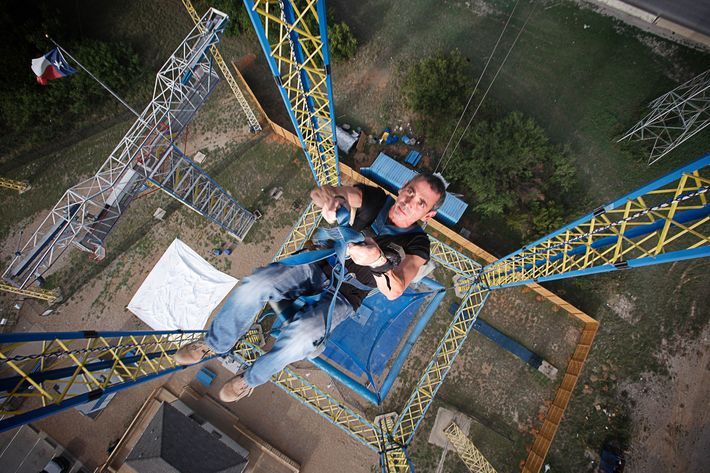
I’m riding my bike along the Hudson River, cruising along at a good fast rhythm, when another cyclist coming the other way pops out from behind a couple pushing a Bugaboo and veers onto my path. Sensing imminent collision, I squeeze further to the edge of the bike path. But his focus is still on the stroller, and by the time his eyes swivel to me, it’s too late — he clips me, our bikes are somehow entangled, and as though moving through molasses I feel my center of gravity catapulting forward off the bike above the vividly textured asphalt, and I find myself having the leisure to wonder: Is this going to hurt?
What I was experiencing at that moment was a psychological phenomenon know as subjective time dilation — the strange temporal elasticity that so often accompanies moments of acute danger. The sensation was immortalized in the scene in The Matrix when Neo is able to perceive the passage of bullets through the air around him. In real life, we can’t see bullets, but we do experience a host of accompanying mind-altering effects, including extra-vivid perception of sights and sounds, intense mental focus, and the weird sense that we’re watching ourselves in a movie. Fear is a powerful drug.
But how, exactly, does your brain slow down time? Maybe the same way a machine does. When you take a slow-motion video with your phone, it ramps up the rate at which frames are recorded, then plays them back at the standard number of frames per second. To find out if the brain takes the same approach, researchers at Baylor and the University of Texas enlisted volunteers who were willing to subject themselves to a nerve-shattering experience called the Suspended Catch Air Device at the Zero Gravity amusement park in Dallas. The participants were strapped into a harness, then dropped from a 150-foot-high tower. After a 2.5 second free fall, a net stopped their descent.
To ascertain whether adrenaline made their brains speed up, the scientists had invented a wrist-mounted device they called the “perceptual chronometer.” The LED display shows pairs of numbers. If the numbers are set to change more quickly than a person’s mind can perceive, he or she will see only a blur. The scientists set the perceptual chronometer’s flicker rate just beyond what their subjects could perceive when calm. If the intense fear of free fall ramped up the subjects’ perception rate, they should be able to discern the numbers.

As instructed, the subjects looked at the device as they fell. (For the most part — one subject was so terrified she kept her eyes clamped.) They saw — a blur. They were no better able to discern the numbers in free fall than they were when safely on the ground.
What this tells us is that our brains don’t speed up when we’re in danger. Instead, the rush of fear hormones causes the brain to retain richer memories of what’s happening. This is related to the “flashbulb effect” that enables us to remember every color, sound, and smell of an emotionally powerful event. This is obviously useful from an evolutionary perspective: If you survive a life-or-death encounter, it could prove useful someday to remember exactly how you did it.
Since the brain estimates the passage of time by how much information is stored within a given interval, richer memories make it feel like more time has passed. What’s neat is that this explanation sheds light on other ways that time can feel bendy to us, on all different sorts of scales. For instance, if you look up at a clock on the wall, you’ll notice that as you first look at it, the second hand seems to be frozen in place, then after a moment proceeds to move normally. That’s because the brain pays more attention to new stimuli. Likewise, if you go someplace new for a week’s vacation, you’ll notice that at first time seems to crawl as you’re bombarded by unfamiliar food, people, and activities. But after a few days you adjust, and the rest of the time zooms by.
There’s an important big-picture upshot to all of this. If you want to live a long time, you should stick to a hard-and-fast regimen of regular exercise and healthy food. Your sleep schedule should run like a Swiss railroad. But if you want your life to seem like it’s lasting a long time, pack it with surprises. Experience intense emotions in unfamiliar environments. Connect with strangers and eat weird things. Scream, laugh, cry. These are the things you remember — and the things you remember are what make up your life.
